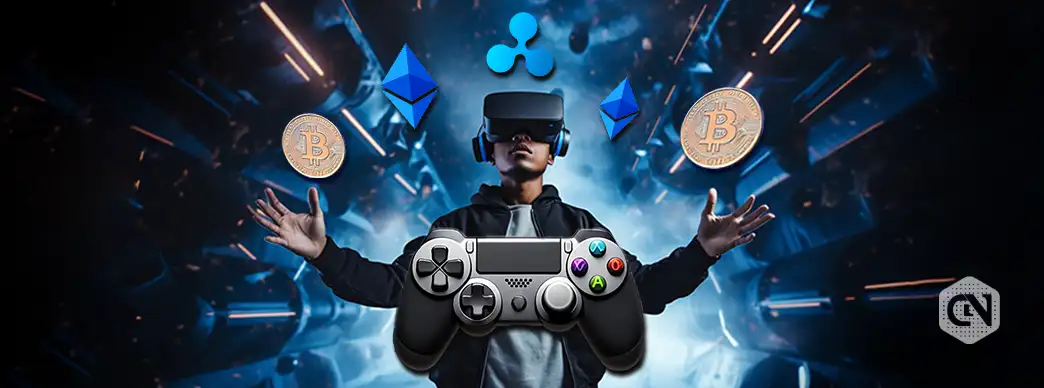Over the last decade, digital currencies spearheaded by Bitcoin have become the rage across the globe. Being a key component of most cryptocurrencies that exist on the market, blockchain is decentralized, and that is why users have an opportunity to enjoy an alternative system that does not exist within the sphere of banking systems.
Although Bitcoin first emerged as a virtual currency and an asset for betting and trading, it has become a profound phenomenon that has influenced and transformed the global financial system, the structure of financial markets, monetary systems, and banking systems around the world.
Benefits of Integrating Cryptocurrencies in Gaming
The gaming industry is a rapidly growing international market that is worth more than $180 billion per year, and it is suitable for adopting crypto. The adoption of cryptocurrencies in gaming is not only transforming or replacing the traditional financial systems but also giving rise to new forms of economies as well as experiencing a paradigm shift within the players.
- Financial Transactions: Cryptocurrencies help improve the ease of making payments, making money transfers, and making other financial transactions, which allows one to do such a transaction without having to go through the normal traditional method of using a bank or a payment gateway. This capability is especially popular in the provision of online games, where users are constantly making cross-border payments and have to deal with the high commissions and the slow transaction velocities provided by traditional banking services. Through the adoption of crypto, gaming companies can make payments quickly for players. This makes it easy for players to visit crypto betting sites or engage in gaming without investing extra time and money on transaction fees. Cryptocurrency is decentralized and operates across borders to provide an open financial environment as opposed to the confines affixed to fiat money.
- In-Game Economies: It is possible to implement cryptocurrencies within a game environment to have a virtual economy where goods can be bought, traded or exchanged with other in-game assets in real life. This makes it possible to effectively undertake cross-game trade or even trade game assets for other cryptocurrencies or even fiat, thus giving tangible value to digital commodities. Crypto makes such transactions secure and verifiable, which increases the usage of in-game item markets.
- Transparency and Security: They are also much more transparent and secure than traditional payment methods can offer. Blockchain removes many opportunities to generate false invoices either as fake invoices or billed invoices, with records that are frozen, verifiable and traceable. This is even more significant to gaming company’s, as it minimize’s the vulnerabilities associated with hacking attack, or unauthorized withdrawal of assets. The process of implementing blockchain ultimately helped to enhance security measures, providing a higher level of confidence through the users and responsible gambling.
Use Cases of Cryptocurrencies in Gaming
- In-Game Purchases and Microtransactions
In gaming, cryptocurrencies are best used to allow users to pay for relevant assets with the help of cryptocurrency without using the services of third-party processors. The use of Bitcoins also will enable players to purchase products and services directly with lower fees and no middlemen.
- Play-to-Earn Models
The play-to-earn model, which has found success in games like Axie Infinity and Sandbox, enables players to earn wages for their gameplay. Players can earn other unique digital assets in the game and then sell them for the opportunity of getting other cryptocurrencies, which makes it even more financially beneficial to engage in games. The transition to this model alters gaming from being a pastime activity to a potential source of earning for millions of individuals globally.
- NFTs and Asset Ownership
NFTs also represent a new way for gamers to own, trade, and even monetize certain kinds of in-game items. While typical assets or in-game assets are typically bound to a certain game or console, NFTs represent digital assets that can be transported across platforms and sold/traded using open marketplaces or stored for value. As such, NFTs fundamentally provide genuine ownership to players in videogames, new economic models, and an opportunity to circumvent the dominant control of the gaming platforms (or industry).
- Decentralized Marketplaces
Players can buy or sell directly to players without having to go through intermediaries. Blockchain marketplaces enable direct trade between players (the podcasters) in peer-to-peer marketplaces. Peer-to-peer marketplaces also bring the ability for gamers to buy/sell their items, weapons, skins, or other virtual property without added fees from intermediaries. Overall, such a revolutionary innovation opens up new ways for gamers to monetize their time and participatory effort within games.
How Blockchain Technology Supports Gaming Innovation
Blockchain technology supports innovations within the gaming industries through the provision of decentralized systems that enhance security, enhance the transparency of digital assets, and afford token ownership and control to the users. Smart contract guarantees free, transparent, and automated transactions, while Blockchain ensures that all data about the game is recorded on a transparent, immutable ledger. This use of a trustless, decentralized environment eradicates unfair competition and fraud cases in online gaming and brings innovative opportunities that benefit both game developers and gamers.
Summary
The advancement of Bitcoin and other cryptocurrencies is revolutionizing gaming and financial sectors as it breaks centralized approaches, raises awareness, and opens doors toward experimenting with innovative innovations. The gaming industry will benefit hugely from these technologies, which will bring about a new future of financial transactions, asset ownership, and in-game economy. As more cryptocurrencies and blockchain-based systems are developed further, their incorporation into gaming is set to unlock even more possibilities that can clearly benefit players as well as developers in today’s virtual world.
